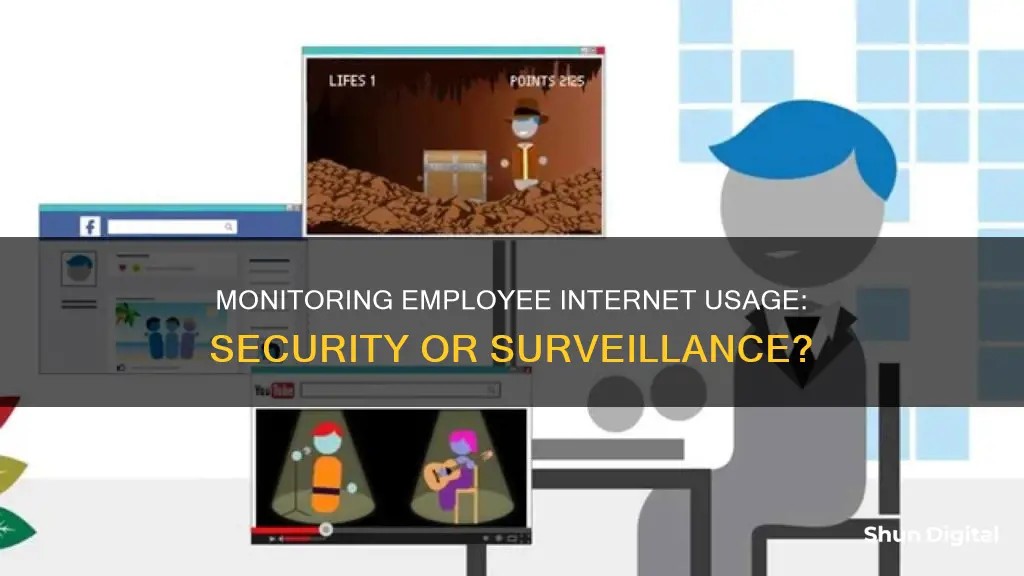
With the rise of remote work, employers are increasingly monitoring their employees' internet usage. This is done to ensure employees are working and to protect the company from security risks. Monitoring software can be installed on an employee's computer or network, tracking their browser history, file transfers, messages, or keyboard and mouse activity. While this can increase productivity and accountability, it also raises privacy concerns and can decrease employee morale and trust. Employers must balance their interests with their employees' privacy rights and be transparent about their monitoring practices to avoid legal issues.
What You'll Learn

To protect company data and systems
Monitoring employee internet usage is an important way for employers to protect company data and systems. Unchecked internet use can increase security risks, impact productivity, and compromise company resources. By monitoring employee internet activity, employers can prevent unauthorized data sharing, detect security risks, and ensure employees are using work time productively.
Preventing Unauthorized Data Sharing
Employee monitoring software can track and log employee internet activity, including the websites they visit and the files they download or upload. This helps employers ensure that employees are not sharing sensitive company data without authorization. For example, monitoring software can detect if an employee is sending proprietary information outside the organization.
Detecting Security Risks
Employee monitoring can also help identify security risks, such as harmful downloads, compromised websites, and phishing attacks, which can lead to malware, viruses, and data breaches. For instance, monitoring software can alert employers if an employee is downloading unauthorized software that could contain spyware.
Ensuring Productive Use of Work Time
Monitoring employee internet usage can help ensure that employees are using their work time productively and not wasting time on non-work-related websites or social media during work hours. This can increase employee accountability and ensure that company time is used efficiently.
Best Practices for Monitoring Employee Internet Usage
When implementing employee internet monitoring, it is important to consider legal and ethical implications. Employers should establish comprehensive internet use policies, obtain employee consent, and ensure that monitoring is limited to the data needed to improve productivity and security. Transparent communication about monitoring practices can help gain employee trust and buy-in.
Additionally, employers should ensure that monitored data is securely stored and accessible only to authorized personnel. Encryption, multi-factor authentication, and data retention policies can help protect the privacy and security of employee data.
Monitoring Power Usage: Track Your Appliance Energy Consumption
You may want to see also

To uphold legal and regulatory compliance
Monitoring employee internet usage is essential for organizations to enhance employee productivity, security, compliance, and cost optimization. However, employers must navigate various laws and regulations to ensure legal and regulatory compliance while respecting employees' privacy rights. Here are some ways employers can uphold legal and regulatory compliance while monitoring employee internet usage:
- Comply with State and Federal Laws: In the United States, employers must adhere to state and federal laws governing employee monitoring. For example, the Electronic Communications Privacy Act (ECPA) allows employers to monitor company-owned devices, while laws in Connecticut, California, and New York require explicit consent and notification before monitoring.
- Establish Comprehensive Policies: Companies should develop and enforce clear policies regarding data security, acceptable computer usage, and time management. These policies should be communicated to employees and include details such as data collection methods, retention periods, and employee consent.
- Ensure Transparency and Consent: Employers should be transparent about their monitoring practices and obtain employees' consent. Informing employees about the monitoring tools and policies helps build trust and address privacy concerns.
- Respect Employee Privacy: Monitoring practices should focus on enhancing productivity and security without invading employees' privacy. Avoid overly invasive methods, and collect only the necessary data to achieve legitimate business purposes.
- Secure Data Storage: Employers must implement robust data security measures to protect monitored data. This includes encryption, access controls, and data retention policies to prevent unauthorized access and potential data breaches.
- Regular Auditing and Review: Regularly audit and review data access and usage to identify any anomalies or unauthorized access attempts. Compare time tracking records with reported hours to detect discrepancies or patterns of time theft.
- Employee Training and Awareness: Educate employees on data security best practices, such as strong password management, identifying phishing emails, and avoiding suspicious websites or downloads. Raise awareness about time management and company policies to improve employee performance and compliance.
By following these guidelines, employers can uphold legal and regulatory compliance while monitoring employee internet usage, protecting their business interests and respecting employee privacy rights.
Monitoring Cox Internet Data Usage: A Step-by-Step Guide
You may want to see also

To preserve employee rights and privacy
Monitoring employee internet usage is a complex issue that requires a careful balance between an employer's interests and an employee's privacy rights. While monitoring can help preserve employee rights and privacy in certain ways, it is important to approach it with caution and adhere to legal and ethical guidelines. Here are some key considerations for preserving employee rights and privacy while monitoring internet usage:
Establish Comprehensive Policies
It is crucial to have clear and comprehensive internet usage policies in place. These policies should outline what data will be collected, how it will be used, who can access it, and the retention period. By being transparent about monitoring practices, employers can build trust with their employees. Comprehensive policies also help employees understand what is considered acceptable and prohibited internet usage, providing clear guidelines for their online activities.
Obtain Informed Consent
Informed consent is an essential aspect of preserving employee privacy. Employers should ensure that employees are fully informed about the monitoring practices and provide explicit consent. In some jurisdictions, such as Connecticut, Delaware, Texas, and New York in the US, informed consent is legally required. By obtaining consent, employers can avoid legal issues and build a culture of trust and transparency.
Limit Monitoring to Necessary Scope
Employers should only collect the minimum amount of data required to achieve their legitimate business purposes. Overly invasive practices without justification can violate employee privacy. For example, restrict monitoring to company-owned devices during working hours and disable it outside of work hours. Additionally, certain monitoring features, such as keystroke logging and screenshot capture, should be limited to specific high-risk roles or situations.
Anonymize and Secure Data
Whenever possible, anonymize collected data by removing personally identifiable information. This helps protect employee privacy while still allowing for analysis of usage patterns. It is also crucial to implement stringent measures to secure monitored data. This includes encryption, access controls, and data retention policies. By safeguarding data, employers demonstrate their commitment to protecting employee privacy.
Use Data for Constructive Feedback
The primary purpose of monitoring employee internet usage should be to provide constructive feedback and guidance to employees. Usage data should trigger supportive actions, such as cybersecurity awareness training, rather than punitive measures. Employers should use the insights gained from monitoring to help employees improve their online habits and productivity.
Comply with Legal Requirements
Different jurisdictions have varying laws and regulations regarding employee monitoring. It is essential to familiarize yourself with the legal obligations and limitations in your region. For example, the EU has stringent worker privacy safeguards, and monitoring policies must be limited to legitimate business needs. Seeking legal counsel when developing monitoring policies can help ensure compliance with relevant laws.
In summary, preserving employee rights and privacy while monitoring internet usage requires a careful balance between organizational interests and individual privacy rights. By implementing comprehensive policies, obtaining informed consent, limiting the scope of monitoring, securing data, using data constructively, and complying with legal requirements, employers can respect employee privacy while also achieving their business goals.
Monitoring PSU Usage: A Comprehensive Guide to Tracking Power Supply Performance
You may want to see also

To increase productivity
Monitoring employee internet usage is an increasingly common practice for businesses, particularly with the rise of remote work. While it may raise concerns about employee privacy, there are several benefits to this approach, with the main one being to increase productivity.
The internet has become integral to modern businesses, with many relying on it for their operations and online payment systems. However, it can also be a major distraction for employees, leading to time-wasting and reduced productivity. A report by the Engagement Institute found that lost productivity costs US companies $550 billion annually, with internet use topping the list of time-wasting activities.
By monitoring employee internet usage, companies can identify and address any misuse or excessive distractions. This can be done by blocking or deterring employees from accessing unproductive sites during work time, which automatically forces them to spend their time on productive activities. Monitoring can also help identify employees who are taking too many breaks or too long to complete tasks, allowing employers to step in when needed.
According to one survey, 81% of employers who monitor internet usage see an increase in employee productivity. Monitoring tools can also provide insights into employees' skills and knowledge gaps, allowing companies to provide targeted training programs to bridge these gaps and increase overall performance.
Other Benefits
In addition to increasing productivity, monitoring employee internet usage can also help protect company information and sensitive data, prevent security risks, and ensure compliance with legal and regulatory requirements. It can also foster a culture of accountability and integrity within the organization.
Best Practices for Monitoring Employee Internet Usage
When monitoring employee internet usage, it is important to establish clear policies and gain employee consent where required by law. Employers should also ensure that any data collected is stored securely and accessed only by authorized personnel to protect employee privacy.
Additionally, monitoring software should not be used punitively, but rather as a tool to provide constructive feedback to employees and improve their habits. Counseling should be the primary recourse for policy violations, with discipline reserved for repeated or egregious cases.
By balancing legitimate business needs with ethical and legal considerations, employers can realize the benefits of employee internet monitoring while maintaining employee trust and regulatory compliance.
Monitoring Bandwidth Usage: Real-Time Strategies for Network Insights
You may want to see also

To ensure compliance with company policies
Monitoring employee internet usage is an important way for employers to ensure compliance with company policies. This can help to uphold legal and regulatory compliance, as well as protect sensitive company data and systems.
For example, in highly regulated industries like finance or healthcare, tracking employee internet usage can help companies comply with legal and regulatory requirements. This is especially important when it comes to protecting sensitive data and preventing data breaches. By monitoring employee internet usage, employers can ensure that staff do not access illegal or dangerous websites, and can also keep track of who is accessing what data and for how long. This helps to ensure that employees are complying with company policies and are not engaging in any unethical behaviour or misconduct.
Additionally, monitoring employee internet usage can help to enforce internet usage policies. By going through an employee's browsing history, employers can see if they are violating company policy, and can more effectively manage their employees' time. This can also help to identify productivity issues, as employers will be able to see if employees are spending time on apps or websites that are not work-related, and can then take steps to block or deter employees from accessing these during work time.
Another benefit of monitoring employee internet usage is that it can help to oversee application usage. By tracking the use of applications, managers can pinpoint inefficiencies and potential issues, and take steps to improve productivity and efficiency.
Overall, by monitoring employee internet usage, employers can ensure that their staff are complying with company policies and are using their time productively. This helps to protect the company's interests and ensures that employees are focused on their tasks, leading to increased productivity and accountability.
Monitoring ChatGPT Usage: Strategies for Tracking Activity and Performance
You may want to see also
Frequently asked questions
Monitoring employee internet usage helps employers ensure their staff are using work time productively and not wasting time on non-work-related websites and apps. It also helps protect the company from security risks and data breaches.
There are several methods for tracking employee internet usage, including time-tracking software, project management software, communication and collaboration tools, web and application monitoring, and performance analytics.
In the United States, it is completely legal for employers to monitor their employees' internet activity on company-owned computers and devices. However, there may be legal requirements to disclose monitoring practices and obtain employee consent, which varies by state and country.







